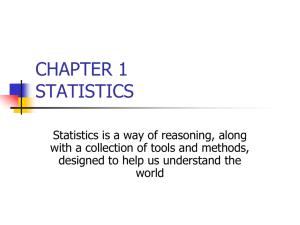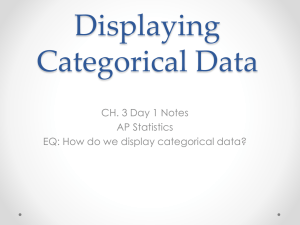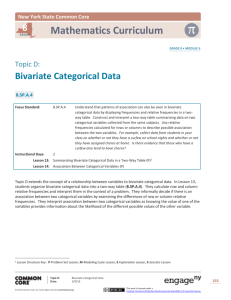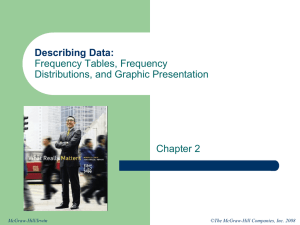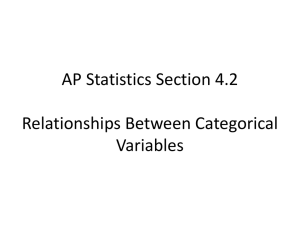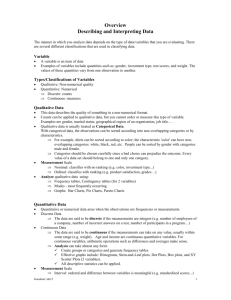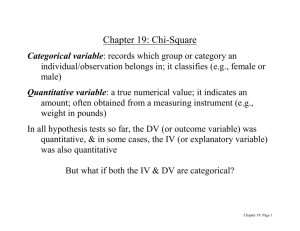Graphs
advertisement
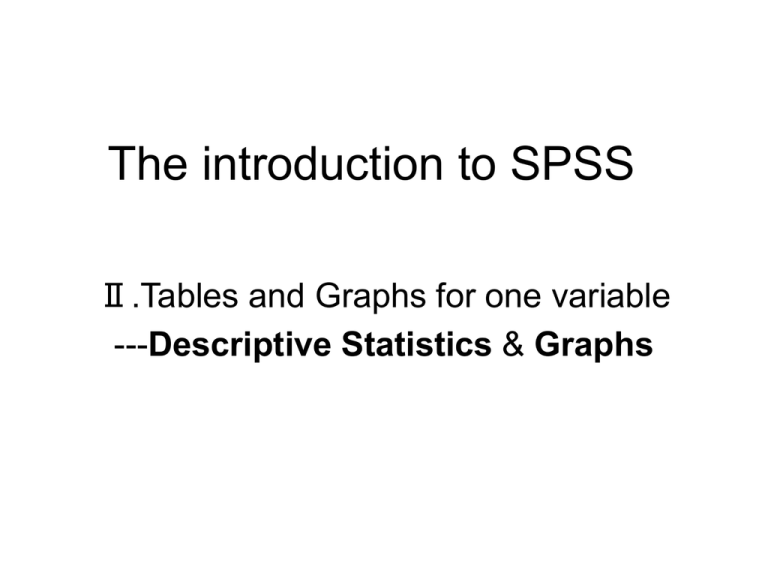
The introduction to SPSS Ⅱ.Tables and Graphs for one variable ---Descriptive Statistics & Graphs Frequencies A good place to start looking at your data. Frequencies Select one or more categorical or quantitative variables. Frequencies Click Statistics for descriptive statistics for quantitative variables. Frequencies Click Charts for Bar charts, Pie charts, and Histograms. Also, you can create all the following charts in Graph. Categorical variables Quantitative variables Frequencies The display style. Descriptives Descriptives Descriptives command provides the sample size, mean, std. deviation, minimum, maximum. If you were interested in another summary statistic, you could click on the Options button, and find several other available statistics. Graphs Graphs---Simple Bar chart One categorical variable Two categorical variables Creates a chart summarizing categories of a single variable. Bar height represent a function of either the category variable itself, or another summary variable. Creates a chart summarizing two or more variables. There is one bar for each variable. Creates a chart summarizing a single variable by individual cases. Graphs---Simple Bar chart How the data are represented on the scale axis. Numeric or String variable Categorical variable Graphs---Simple Bar chart Graphs---Simple Bar chart Categorical variable Graphs---Simple Bar chart Bar represent -other statistic Graphs---Simple Bar chart Graphs---Simple Bar chart A paneled chart is a grid of subcharts. The subcharts are of the same chart type and share axes, but for a different group of one or more categorical variables. Graphs---Cluster Bar chart Categorical variables Select a cluster variable used to group bars. Graphs---Cluster Bar chart frequency of library use Not in past year Less than once a month Once a month 2 or 3 times a month Once a week or more 250 200 Count 150 100 50 0 Less than high school High school Some college highest degree College Graphs--- Simple & Cluster Bar chart frequency of library use Not in past year Less than once a month Once a month 2 or 3 times a month Once a week or more 250 200 Count 150 100 50 0 Less than high school High school Some college highest degree College Graphs---Stack Bar chart Graphs---Stack Bar chart frequency of library use Not in past year Less than once a month Once a month 2 or 3 times a month Once a week or more 500 400 Count 300 200 Each stack consists of a bar divided into segments stacked on top of one another. 100 0 Less than high school High school Some college highest degree College Graphs---Simple & Cluster Bar chart frequency of library use Not in past year Less than once a month Once a month 2 or 3 times a month Once a week or more 500 400 Count 300 200 100 0 Less than high school High school Some college highest degree College Graphs---Interactive---Bar chart Using the different colors or styles to distinguish each category. Graphs---Interactive---Bar chart 500 f re qu en cy500 of l i b rary u se 400 Not in p Less th Once a 2 or 3 ti Once a Bars show counts 300 Bars show Coun t Coun t 300 200 100 Less than high school f re qu e Not in past year Less than once a month Once a month 2 or 3 times a400 month Once a week or more 200 100 H igh school Some college h i gh est d eg re e College Less than high school H igh school Some college h i gh est d eg re e College Graphs---Pie chart Graphs---Pie chart Graphs---Interactive---Simple Pie chart Graphs---Interactive---Simple Pie chart Graphs---Interactive---Simple Pie chart Graphs---Interactive---Clustered Pie chart Graphs---Histogram A histogram groups the values of a variable into evenly spaced groups (intervals or bins) and plots a count of the number of cases in each group. The count can be expressed as a percentage. Graphs---Interactive---Histogram Graphs---Interactive---Histogram Graphs---Interactive---Histogram You can modify the min and max values shown on a histogram, as well as the interval width. This is particularly useful when outliers cause the majority of values to cluster in a few bars. Graphs---Interactive---Histogram 75 250 200 50 Coun t Coun t 150 100 25 50 0 20 40 60 Ag e 80 20 40 60 Ag e 80 Graphs---Boxplot Boxplots show the median, interquartile range, outliers, and extreme cases of individual variables. Graphs--- Boxplot---groups of cases label outliers or extreme cases on the plot, otherwise, case number Graphs--- Boxplot---groups of cases Graphs---Boxplot---groups of cases Number of years using the Internet Graphs---Boxplot---separate variable Graphs---Boxplot---separate variable Graphs---Boxplot---separate variable Graphs---Interactive---Boxplot Graphs---Interactive---Boxplot Edit Chart • The Chart Editor provides a powerful, easy-to-use environment where you can customize your charts and explore your data. • Double click anywhere on your chart. The Edit Chart Window displayed. There are several buttons displayed across the top and down the left side of the interactive graph. Edit Chart Edit Chart Select a chart element, and then from the menus choose: Edit Properties Collapse small parts. Edit Interactive Chart
